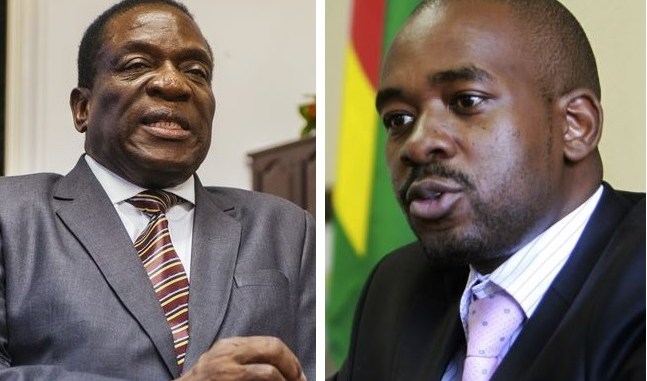By Alex Magaisa
This article makes the case for the importance of the political story in the life of a political party.
The political story is aspirational. It represents the set of values, beliefs, and policies of a political party. It is part of the myth-making exercise that forms the pith of every organization that seeks to harness the support of citizens.
Since the existing political order is based on a set of carefully constructed political stories, the challenge of the opposition is to weave a better alternative; a political story that appeals to the imagination of not only the traditional supporters but the hotly contested undecided voter.
But before we discuss the key role of the political story, I will start with an examination of an important concept that seems to be eluding our electoral referee.
ZEC and Accountability
The Chairperson of the Zimbabwe Electoral Commission (ZEC), Justice Priscilla Chigumba recently told a meeting that her organization is only accountable to parliament.
The statement was made in the context of dismissing social media where citizens have individually and collectively expressed critical comments regarding ZEC’s performance over the voters’ roll.
“As we are in election mode, you will be reading all about voter’s roll fraud from nameless, faceless individuals on social media. They continue to send questions and we know our mandate and how to account to stakeholders … ZEC will account through Parliament according to the legislative framework, not social media,” the ZEC Chairperson is quoted as having said.
The people she rudely refers to as “nameless” and “faceless” individuals are Zimbabwean citizens. One group, Pachedu has been conducting a forensic-style survey of the voters’ roll which has uncovered some concerning anomalies.
The irony is that although Justice Chigumba was being dismissive, she was in fact responding to social media. Her organization has twice issued press statements in response to issues raised by Pachedu.
Even if the responses have been petulant, they are efforts towards accounting to citizens, the very thing she is saying ZEC does not do.
In any event, her dismissive approach is inconsistent with ZEC’s presence on Twitter. The Twitter handle communicates information from ZEC to citizens on social media.
Communication is a form of accountability. When ZEC communicates through the handle, it is involved in a process of accounting to citizens.
Communication informs recipients of information that enables them to make use of it. But they are not just passive recipients of the information. They are active participants who question and probe the accuracy of the information.
In doing so, they are asking ZEC to account for its information. It is therefore a two-way process that benefits both the giver and recipient of the information.
The fact that Justice Chigumba denies ZEC’s wider accountability obligations betrays institutional ignorance of the notion of accountability. As an institution, ZEC’s understanding of the principle of accountability is limited by legalism. ZEC sees accountability only in the legal sense.
But the concept of accountability is more inclusive. Legal accountability is only one form of accountability. There are political, moral, professional, and other forms of accountability, all of which matter.
Some of these forms of accountability might work better at instilling confidence in the electorate than rigid legalistic approaches. As I have already stated, effective communication is an easy way by which ZEC can account to the citizens.
The notion of accountability simply means that one is answerable to another for their conduct. It is especially important where one is exercising power on behalf of another person.
A person who has power must account for how they are exercising it. The existence of accountability acts as an incentive to prevent the abuse of power. It is even more important where one person has given authority to another to exercise power.
The person who has given power is the principal and the person exercising the power is the agent. This is an asymmetrical relationship where the agent has more information than the principal. It is therefore important that the agent must be fully accountable to the principal.
Our Constitution recognizes this imbalance and imports principles of equity so that the agent is treated as a fiduciary who owes duties of good faith and loyalty to the principal.
This reasoning informs one of the foundational principles of our Constitution and shapes the relationship between public bodies such as ZEC and citizens.
Section 3 of the Constitution states that one of the principles of good governance which binds state institutions is “respect for the people of Zimbabwe, from whom the authority to govern is derived”.
As a state institution, ZEC’s relationship with the citizens is built upon this principle that it derives its authority from the people. In other words, the people are the principals and ZEC is their agent. Therefore, ZEC has a constitutional duty to account for its principals.
How ZEC accounts to its principal, the people is a secondary question. Legally, like all other independent commissions, ZEC is required to submit an annual report of its operations and activities to Parliament.[1] It is also required to submit a report to Parliament on the conduct of every election and every referendum.
Additionally, parliament may, through its relevant committee, summon the ZEC to account for its activities. Parliament has this role because Zimbabwe is a representative democracy where parliamentarians stand for the people.
Therefore, politically, when ZEC is accounting to parliament, it is effectively accounting to the people through its representatives.
This essential point is missed by the ZEC Chairperson who wants to draw a non-existent distinction between parliament and the people.
But as already stated, legal accountability is only one form of accountability that is expected from ZEC. The position of ZEC might be likened to that of a football referee.
The referee is expected to account to the appointing authority. At a World Cup tournament, the referee is appointed by FIFA and therefore complies with the rules and procedures of FIFA and formally accounts to it. However, the network of actors to whom the referee is accountable is wider than FIFA.
He is accountable to the teams and players whose match he is refereeing. He is also accountable to the fans who have an active interest in the match. Furthermore, he is accountable to his peers whose professional standards and reputation he must uphold.
It is accountability that requires the referee to communicate with the players and officials whose match he is officiating.
Communicating a decision and the reasons for it is part of exercising that accountability. Nowadays, professional football has introduced measures to assist referees, acknowledging that they are not infallible. The VAR is a tool that helps referees to be more effective and accountable.
Hence referees have at times changed their initial decisions after a VAR check. The elections referee occupies a similar role. It must give reasons for its decisions.
This instills confidence in the referee. Where errors are identified and highlighted by interested parties, it must investigate and correct them.
Therefore, when citizens highlight problems with the voters’ roll, ZEC should not be arrogant and dismissive.
In any event, even if we take the legalistic approach, the requirement for ZEC to exercise fair administrative conduct also has firm constitutional foundations. Section 68 of the Constitution provides that “every person has a right to administrative conduct that is lawful, prompt, efficient, reasonable, proportionate, impartial and both substantively and procedurally fair”.
Furthermore, any person whose right, freedom, interest, or legitimate expectation has been adversely affected by administrative conduct is entitled to be given prompt reasons in writing explaining the decision.
ZEC is a public body that is required to fulfill this right. Any person who is aggrieved by ZEC can approach the courts to seek judicial review of its conduct.
That way, ZEC can be held accountable. But a responsible administrative authority would take pre-emptive action to avoid being sued for breaching citizens’ rights.
When citizens engage ZEC on social media, asking it to explain, they are merely using modern social space to demand accountability from ZEC and that is perfectly legitimate.
As I have demonstrated, even if we take ZEC’s legalistic approach, several legal grounds require ZEC to account to the citizens, contrary to the message from its chairperson.
In any event, ZEC has a moral duty to account to the citizens. ZEC is one of the most important political referees in the country because it controls the process of choosing the leadership at local and national levels.
It owes citizens a duty of care in the exercise of its functions. It is morally obliged to be fair and impartial in its conduct.
Unfortunately, the institutional attitude of ZEC is one of ultra-defensiveness. It treats questions from citizens with suspicion and hostility. Its responses betray a partisan attitude, behaving as if it is at war with citizens.
Instead of being hostile, ZEC should be more receptive to criticism. It is counter-productive to be dismissive of social media when it has an established presence in the same space. It is there because it recognizes the value of communicating with and therefore accounting to the people.
If anything, it should be enhancing and amplifying its social media presence, making use of spaces to disseminate information and educate voters. It can’t be on social media and at the same time try to dismiss social media citizens.
Why every political party needs a good story
There has been some discussion in recent days concerning issues about ideology. Sometimes matters are needlessly complicated by excessive focus on form over substance.
It shouldn’t be in dispute to any serious political player that every political party needs a persuasive story to tell the electorate.
Every political party is trying to sell a dream to the political community. That dream can be called by any name, but its purpose is to win believers.
All things being equal, those whose political story gains the most significant number of believers has a greater chance of winning the election.
As historian Yuval Noah Harari explains in Sapiens – A Brief History of Humankind, one of our unique gifts as humans is our ability to imagine. Through this ability to imagine, we can create things that do not otherwise exist.
Things ranging from religions, money, companies, nation-states, law, or even human rights would not exist as they do without human imagination.
These products of imagination are called imagined realities and are different from objective realities such as mountains or gravity.
The difference between imagined realities and objective realities is that objective realities are independent of people’s beliefs.
You do not have to believe in Mount Kilimanjaro for it to exist. But things like religion, money, or a political party and its political story are heavily dependent on people’s belief in them.
We lost the Zimbabwe Dollar in 2009 because we had ceased to believe in it. Political parties have ceased to exist because people stopped believing in them.
The MDC under Douglas Mwonzora is literally collapsing because a significant number of people have ceased to believe in it. But even if we stop believing in the Victoria Falls, it won’t cease to exist because of our lack of belief. It is an objective reality.
The key thing is that those who seek political power are selling dreams. They must construct persuasive stories that appeal to the imagination and draw in believers.
Politics is a game of imagination and imagined realities and politicians are weavers of those imagined realities.
The ones that are better at weaving the best stories triumph. We have before us a vivid example that illustrates the importance of storytelling and the magic of imagination in politics.
The same people who are now members of the Citizens Coalition for Change (CCC) were just a month ago members of the MDC Alliance. They did not have to do anything except change their minds.
Just by a switch of imagination, they stopped believing in the MDC Alliance and started believing in the CCC.
Harari reminds us that while people might initially be dismissive of the idea of myths (stories), many might be surprised that a significant proportion of our lives is affected by them.
They facilitate the building of large-scale networks of cooperation between people. Think of how a nation-state brings together diverse communities under a shared sovereign identity, or how the listed company mobilizes thousands of people who don’t know each other and who might even dislike each other to invest in a successful business.
There is nothing to back fiat currency such as the US dollar except people’s belief that it has value. People in a diverse range of countries who have never met and may never meet in their lifetime will cooperate and work with each other just because they are Catholic. Likewise, very different people will congregate under a political party.
What is evident is that the success of an imagined reality (the story) depends on whether people believe in it.
The most successful stories are the ones that attract more people to believe in them. That’s why some religions, currencies, or nation-states are more successful than others.
But while this belief is organic and unforced, in some cases imagined realities rely on force. Therefore, some religious orders have used egregious force and violence against others.
Some nation-states have also used military might to coerce others into acceptance. Some political parties have relied on violence to force people into supporting them.
But as Harari puts it, the best force of an imagined reality is its “true believers”.
Since they depend on beliefs, imagined realities are vulnerable. They need more protection. As Harari says, there is a need for “continuous and strenuous efforts” to safeguard imagined orders from destruction.
Violence and coercion are possible methods of protecting an imagined order. This explains why authoritarian regimes use repression. But violence is unsustainable.
As we have seen imagined realities need “true believers” that promote them. “A single priest often does the work of a hundred soldiers – far more cheaply and effectively,” writes Harari. Authoritarian regimes also survive because they have “true believers” who believe in them.
What this implies is that those who are challenging an authoritarian regime must have better stories and true believers of those stories.
It is “necessary to convince many strangers to cooperate with one another. And this will happen only if these strangers believe in some shared myths. It follows that in order to change an existing imagined order, we must first believe in an alternative imagined order,” advises Harari.
This last line is very important for our purposes: to successfully challenge an existing imagined order, you must have a better alternative.
If we apply this to the Zimbabwean context, the prevailing imagined order was created by ZANU PF. It has relied on a combination of devout believers and coercion to sustain this story.
The greatest challenge to ZANU PF’s imagined order has come from the original MDC. The MDC’s imagined order was based on the idea of change. That story was popular and drew many believers. But this story became tired. The MDC also collapsed under the pressure of ZANU PF’s coercion.
Now the CCC has emerged and one of its most important tasks is to construct an alternative story that is significantly more persuasive than ZANU PF’s and the old MDC’s stories. There is a need for a new persuasive political story.
The political story is a collection of ideas, policies, visions, and aspirations of a party. It is a story of how a party seeks to organize society and manage and allocate scarce resources.
Each party aims to tell a story that is better than its rival’s. Throughout history, parties’ stories have been based on certain traditional ideas.
For example, a party whose story is based on the idea of capitalism would sell a story that prioritizes free markets, private ownership, low taxes, small government, pro-business policies, and restriction of union rights.
By contrast, a party whose story is based on the idea of socialism would be stronger on collective ownership, state intervention, nationalization, big government, higher taxes for the wealthy, stronger workers’ rights. Nowadays, there are many more ideas beyond the traditional binary of capitalism and socialism.
But it is essential for a party to have a persuasive story and to tell it with confidence. When people say what is your story, this is what they are asking for. Across the Limpopo, you might agree or disagree with it, but the EFF has a political story that defines it and its conduct of politics.
All this helps us to understand that while it is not hard to form a political party because as we have seen it is a creation of the imagination, creating a persuasive story that draws people and guides the party is a different task altogether.
Zimbabwe has scores of political parties but most of them are one-man bands. They have not grown beyond their founders because they have not been able to craft and sell good stories.
As I conclude, let me quote from Harari. “The key is in being able to tell effective stories, which is not simple. The biggest challenge is in convincing everybody else to believe in the story.
Much of history revolves around this question: how does one convince millions of people to believe particular stories about gods, or nations, or limited liability companies?
Yet when it succeeds, it gives [people] immense power, because it enables millions of strangers to cooperate and work towards common goals”.
This is precisely what a political party needs. It needs to tell an effective story and convince millions of strangers to believe in that story.
If successful, the party will have immense power because it will have drawn millions of people into its ranks. You must craft a story that appeals to the imagination of the voter. It does not matter by what fancy name that story is called, but every political party must have a solid and persuasive story.
The CCC has a great opportunity to craft a solid and persuasive story. Current believers might say they are already persuaded. But a wise fisherman knows the difference between fish in his pond and fish that are still in the river. His energies are better spent at the river.
That is why a wise politician needs to weave a persuasive story. Call it by whatever name, story, ideology, fiction, myth – the cat must catch the mice.
WaMagaisa














